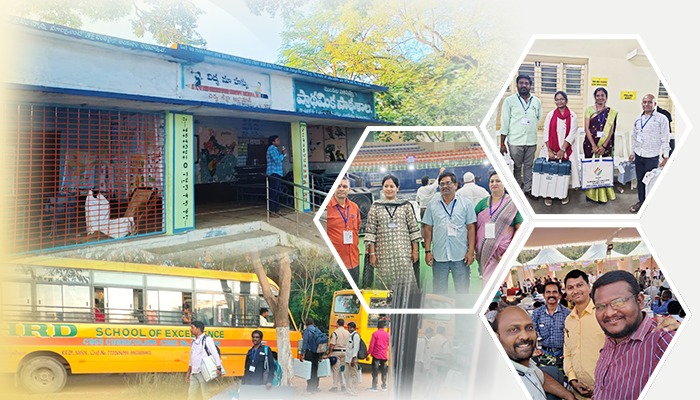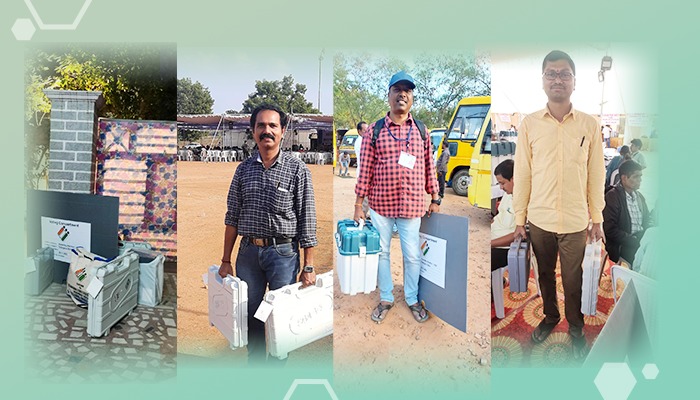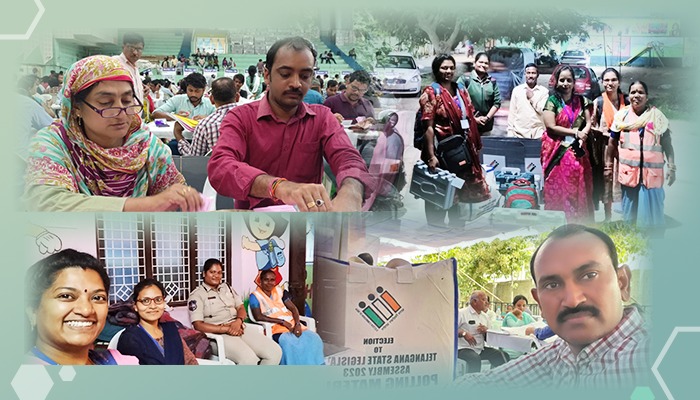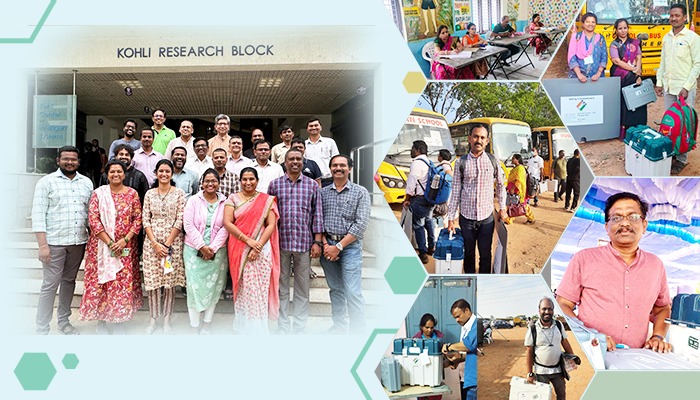Even as the dust may yet be settling on Telangana’s Dance of Democracy, IIITH takes a moment to acknowledge the efforts of its own who are part of the veritable army helping citizens exercise their franchise.
It is around 4.30am on 1 December 2023 – the morning after the Telangana Legislative Assembly elections. The city is slowly coming to life but Satish Kumar Kudikala, Santosh Kumar Ladi, Venugopal Reddy and many other staffers who volunteered in the electoral process from the International Institute of Information Technology Hyderabad (IIITH) are calling it a day as messages of ‘reached home safely’ and ‘going to bed now’ are trickling in. “About 20% of our staff and faculty volunteered for this noble duty,” remarks Prof. P J Narayanan, Director, IIITH. The institute has had a history of being associated with Election Day duties. In the year 2014, around a 100 employees were enlisted for the same. “It was compulsory that year but from then on, in 2018, 2019, 2023 as well as for some of the GHMC elections, we made it completely voluntary. However, we continue to facilitate and support our employees in every way,” says the Director.
A Party Of A Different Kind
While Election Day lasts for a single day where one casts their votes at booths that are open from 7am until 5pm, the behind-the-scenes work for the same kicks off a day prior. All polling staff are imparted training a few weeks before D-Day and have to report at centres to pick up election-related materials such as EVMs, VVPATs (voter verified paper audit trail) and so on. They are then taken in buses to their respective polling stations where they typically spend the night keeping a tight watch on the sensitive materials. According to the Handbook for Returning Officer that has been put together by the Election Commission of India (ECI), a polling party in normal course consists of a Presiding Officer and three polling officers. While the first polling officer is in charge of the marked copy of electoral roll and responsible for identification of voters, the second polling officer makes entries in the Register of Voters, cross checks the photo ID, takes signatures of the voters (or thumb impressions in case of illiterate voters), applies indelible ink and issues voters slip indicating the serial number in which they have to go into the voting compartment to cast vote. The third polling officer is the custodian of the Control Unit or “CU” and activates the Ballot Unit or “BU” by pressing the Ballot button before allowing the voter to go inside the voting compartment. The staff and faculty at IIITH have played a gamut of roles from polling officers to micro observers to sectoral officers and counting staff too.

Into The Wild
“Voting is an important part of the country’s democratic process. We keep complaining about this is not right and that is not right. And who will make it better? This is my attempt to make a positive contribution, to see if I can make things better,” says Prof. Shatrunjay Rawat, who has not only been a repeat volunteer but also whose election duty tales have been the stuff of legends. The professor, who is a member of several key governmental advisory committees, is famously known to report at polling stations fully equipped to handle exigencies that only polling parties are aware of. Quipping that assignments for polling duties are much like being airdropped into unfamiliar territory, Prof. Rawat says, “From my experience in 2014, I realised that it’s not a very kind environment where officials are posted, and you are essentially left to fend for yourself. It’s better to go prepared like an NCC cadet and I carry extra stuff in case someone else needs it too.” It’s little wonder then that his car trunk is laden with dhurries, blankets, mosquito nets, food, dry fruits and nuts. The cautiousness certainly paid off during his assignment in the Lok Sabha elections of 2019 when the primary school he was stationed at lacked basic power supply. “With no lights, there were obviously no fans either to drive away mosquitoes and the mosquito nets came in handy,” he notes wryly.
What Can You Do For The Nation?
Volunteering is second nature for Vivek Gupta who is a Senior Technical Assistant at IIITH. His stimulus for poll duty volunteering can be traced to the year 2014 when his polling party comprised of an illiterate junior clerk whose only job was to apply the indelible ink on voters’ fingers. “I was surprised that we don’t have too many educated people who are involved. From then on, every time there is an election duty, I make it a point to volunteer because I don’t want such people to be part of such a massive decision,” he says passionately, adding that everyone should be knowledgeable enough to handle any kind of situation. For Anusha Edara, Administrative Assistant in the Stats Cell, a desire to be of some sort of service took precedence. “I also wanted to represent the institute in some way,” she says while admitting a little sheepishly that she hadn’t done due diligence on the ‘what’ and ‘how’ of the process she was signing up for. “I didn’t know one had to report the previous day and stay over at the polling booth,” says the mother to 4-year-old twins. With 3 women polling officers at the booth, the group had a lady police constable stationed all night in addition to 2 lady GHMC workers who were commissioned to support them. “There was adequate safety and all kinds of support. We were very well taken care of,” avers Anusha while expressing gratitude to her husband for holding fort at home in her absence.
Carving Out A Sector
Prof. Chiranjeevi Yerra says he signed up to participate in the electoral process not only due to his sense of responsibility as a citizen but also because he believed there could be a shortage of personnel in the grand exercise. “Indeed, once I saw the situation there and worked as a sectoral officer, it’s much needed,” states the professor whose expertise lies in spoken language research. Like the term suggests, a sector officer is in charge of a sector of a constituency comprising a cluster of polling stations. In Prof. Yerra’s case, there were 15 polling stations under him. One of the main functions of a Sector Officer is to manage communications between the Presiding Officer (PO) of a polling station and other higher officials such as the Returning Officer (RO). He had his task cut out for him a good 2 months before the day of voting. From handling EVMs and VVPATs, to conducting mock polls, he also had to ensure adequate infrastructure such as the availability of ramps, drinking water, fans, lights, toilets and other facilities at polling stations. “In addition to these, we have to make sure the Model Code of Conduct is observed and that there is no polling-related bias anywhere in the vicinity of the polling station and that the voters are confident enough to step out to cast their votes.” Narrating how novel situations – those undocumented yet – arise, Prof. Yerra says that owing to the great degree of responsibility that the Presiding Officer is vested with (and consequently blamed for if things go South), it’s not uncommon to find many a no-show from the appointed POs on D-Day. “We immediately contact some of the reserve POs and have to spend some time convincing them to take up the role. In some cases, the same reserve staff will have committed to another Sector Officer leading to more chaos.”

Women And Agency
Prof. Radhika Krishnan’s enduring memory of her 2014 polling duty in “a remote rural location” is that of sleeping on a canvas sheet with a dupatta as a makeshift blanket. “We were ill-prepared, but we only had to sleep for a few hours because everyone is up by 4am or so to begin conducting mock polls – a process where polling agents cast dummy votes to test if everything works and so on,” narrates the professor who is part of the Human Sciences Research Group at IIITH. A keen follower of Politics, Prof. Krishnan’s past work includes a computational analysis of public political sentiment during the 2019 general elections. Speaking of polling booth duty, despite labelling it as extremely hectic, she emphasises that it is very important for women to participate in the entirety of the election process and not just voting alone. “At the end of the day, it gives you a ringside view of what happens and what doesn’t. There is a position of accountability and in one sense even power in the polling booth which of course is good, if it is as democratic as possible. It’s important for women to be part of this because so many women come in to vote. And any public space warrants as much diversity as possible in order to make everyone feel comfortable,” she observes. Additionally, the professor believes that with tasks such as collating voting lists, or numbers, cross-verification, and so on, women need to feel they are part of this important process and understand what it takes.
Home Vote Happenings
This year, the ECI introduced a novel facility of providing senior citizens (above 80 years of age) and persons with 40% disability the convenience of voting at home. In the Telangana Assembly elections, this process took place over two days – November 25 and 26. The polling team which visits these voters in their homes, typically comprises of 2 polling officials, a videographer and a security personnel. Prof. Rawat who was enlisted as an independent observer to maintain sanctity of the voting process reveals that it was an entirely new experience where he had to walk through 5-star gated communities to illegal shanties and ‘jhuggi-jhopdis’. “We encountered all sorts of people – from those who were grateful that we were coming to them and ensured everything was taken care of, to those who were entitled and didn’t care what we had to go through,” he remarks, elaborating that in some houses the group was welcomed with tea, coffee, snacks and the like, and in some others there was palpable disdain and irritation as evinced by the younger family members. “In a polling booth, there may be physical inconveniences but at least you are safe. Here, you are exposing yourself by walking right into the middle of any trouble. Like, in one case the son was drunk and began haranguing us with ‘kaam toh kuch karte nahi, vote lene aate hai’.” It took the presence of the accompanying armed guard to defuse the volatile situation.
The Counting Chronicles
Prof. Rajakrishnan Rajkumar’s ‘why’ behind the election enlistment stems from two reasons. “One is intrinsic,” he says, explaining that he has always followed politics and wanted to experience it first-hand. The other was that he thought the institute could benefit from his participation. The professor from the Language Technologies Research Centre (LTRC) reasons that his zero to little proficiency in Telugu made him an obvious candidate for vote counting duties rather than as part of a polling party. Prof. Bhaktee Dongaonkar, Cognitive Science lab, opted to be a counting assistant too. In her case, it was curiosity to understand how the system works that prompted her to sign up. At the counting centres itself the process is somewhat like this: Each table set up in the counting hall has 3 persons assigned to it, a counting assistant, a counting supervisor and a micro-observer. Prof. Rajkumar’s job as a counting assistant was to unpack the EVM from a box, and request the counting supervisor to break open the seals. In order to prove that it was a fair process, the EVM machine would then be raised to a certain height and displayed to the polling agents.

“Our role (as counting assistants) was very minimal. Since we don’t come directly under the government, it makes us non-gazetted officers and only gazetted officers can break the seal and check if it is tamper-free,” explains Prof. Dongaonkar. When the EVMs are turned on, they display the total number of votes garnered in that polling station along with the number of votes received by each candidate. “My table experienced 2 small glitches,” recounts Prof. Rajkumar. One was a mechanical issue where no one could open the box in which the EVM was stored because the lock was jammed. And the other was that the EVM had been switched off before completing the process. “Apparently the poll was registered but the Presiding Officer hadn’t closed the poll in the machine. It took an extra 10 minutes for the Returning Officer to be summoned to reset the machine. Luckily no one challenged the process nor asked for a recount,” says the professor.
Scope for improvement
As someone who has created a polling duty checklist of his own based on his experiences so far, Prof. Rawat remarks that a sectoral officer’s audit of polling stations can make or break the experience for polling parties. “Basically preparing a polling booth for readiness from all points of view is crucial,” he says. It was the lack of preparedness at his booth in 2019 that found them scrambling for a power connection at the nth hour. “If the basics are not taken care of, it gives a chance for political party activists to intervene and opens up a window of opportunity for influence. So sectoral officers’ findings should get into the checklist of the EC so that they can give advisories to polling parties.”
Planning
When the electoral wheels are set in motion months ahead of Election Day, it also kicks off a series of processes that are unfortunately interdependent on each other. “If only the planning and organisation was a little more efficient..,” rues Prof. Yerra wistfully. He offers an example of the task of commissioning of EVMs which was dependent on loading of VVPATs with contestants’ information. “This was something that the engineers should have done previously. By arriving late, the EVM commissioning was further delayed. We could get only 5 EVMs commissioned by 10 pm on the first day.”
Tech and Communication
“I wish the process of communication with election volunteers was better. We got random phone calls from GHMC officials asking us to report the next day. I personally had a project evaluation scheduled which I had to cancel, because this is top priority and of national importance. The identity card distribution was also last minute causing quite a bit of anxiety,” says Prof. Rajkumar. During the counting process, when the EVM is switched on, it takes around 5 to 10 minutes to display the whole list of candidates and the number of votes per candidate. “This is time consuming. If only there was a faster mechanism to tap into the system whereby all the records could be displayed in one go..,” wishes Prof. Dongaonkar.
Improved and Better
Vivek Gupta compares the entire process over the years as a volunteer and finds it more streamlined and far easier than what he has previously experienced. “Compared to what I’ve done in the past, I found it very easy this time. There are processes put in place and people are getting used to it. The arrangements were very nice,” he reiterates. Ask Satish Kudikala why he got home late that morning, and he explains that his polling booth had 1400 registered voters. “Of these, 1071 turned up to vote! In fact at 5 pm, which is the closing time, we still had 50-60 people waiting in line. We can’t turn them away so our actual voting process came to a close by 7 pm after which is a lengthy process of sealing the EVMs, doing a fair bit of paper work and making our way back to the distribution centre,” he reveals. Would he volunteer again? “Yes, yes, happily! It’s a very good job. The only discomfort may be in spending the night at the polling station,” he says, reasoning that such exposure to the ‘real world’ is necessary to acknowledge the comforts that one is used to at IIITH.
Nudging Apathy
Perhaps Prof. Yerra sums it up best when he says, “If only indifferent voters get a glimpse into the gargantuan exercise that goes on over a period of a few months involving several thousands of people, from the higher ups such as the District Election Officers to the personnel in the polling booths, maybe they’ll be nudged out of their apathy and inspired enough to come out and vote.”
December 2023

